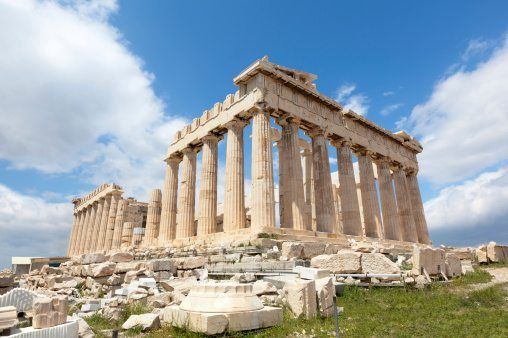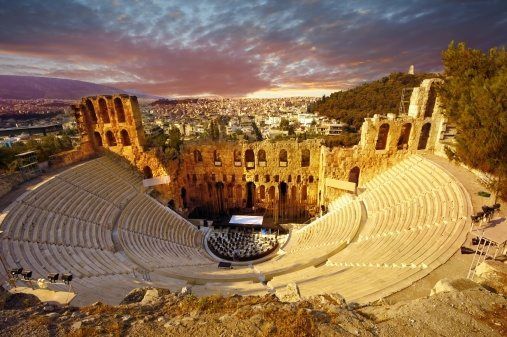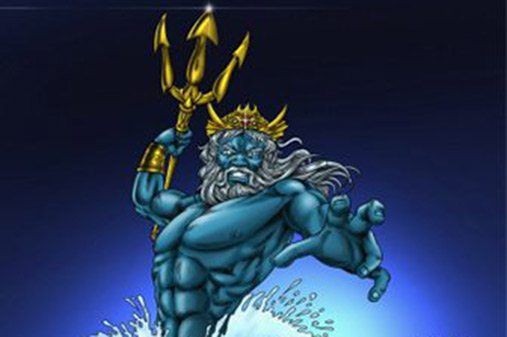10 facts about Ancient Greece
Learn all about this super-cool civilisation!
Ready for an adventure back in time, gang? Then join us as we discover ten fascinating facts about Ancient Greece! And once you’ve had your fill of Ancient Greek facts, be sure to scroll down to learn more about Greece today…
Article continues below…
Facts about Ancient Greece
1. Ancient Greeks lived over 3000 years ago. Their civilisations followed a Dark Age in Greece, which is thought to have ended in 800 B.C. For the most part, Ancient Greece was divided into several small city-states, each with their own laws, customs, and rulers. However, in the 300s B.C., these small city-states were forced to unite under one ruler: Alexander the Great. He was the founder of the Ancient Greek Empire, which stretched into Europe, Egypt, and South-West Asia.
2. The Greeks had some strange superstitions about food – some wouldn’t eat beans as they thought they contained the souls of the dead!
Did you know that we have a FREE downloadable Ancient Greeks primary resource? Great for teachers, homeschoolers and parents alike!
3. The Ancient Greeks were descended from the Mycenaeans, who were also the first writers and speakers of ‘Ancient Greek’. A famous legend tells how, in 1180 B.C., the mighty Mycenaeans conquered the city of Troy – by hiding inside a giant wooden horse! The horse was left outside the city’s walls and, thinking it a gift, the people of Troy wheeled it inside… only for the sneaky Mycenaean soldiers to creep out and seize the city!
4. Did you know that the Ancient Greeks invented the theatre? They loved watching plays, and most cities had a theatre – some big enough to hold 15,000 people! Only men and boys were allowed to be actors, and they wore masks, which showed the audience whether their character was happy or sad. Some of the masks had two sides, so the actor could turn them around to change the mood for each scene.
5. Most Ancient Greeks wore a chiton, which was a long T-shirt made from one large piece of cotton. The poor slaves, however, had to make do with a loincloth (a small strip of cloth wrapped around the waist)!
6. The Ancient Greeks held many festivals in honour of their gods. To celebrate the god Zeus, for example, the first Greek Olympics were held in the city of Olympia in 776 B.C. and are thought to have inspired our own Olympic Games! The winners of each event were given a wreath of leaves, and when they returned home, they would be given free meals and the best seats in the theatre!
7. Statues of Greek gods and goddesses were placed inside temples, the most famous of which is the Parthenon. This temple in Athens was built for the goddess Athena, the protector of the city.
8. Events at the Greek’s Olympics included wrestling, boxing, long jump, javelin, discus and chariot racing. But those taking part in the wrestling event had to be the toughest, as there were hardly any rules – and they had to compete naked. Eek!
9. The Ancient Greeks had lots of stories to help them learn about their world. The gods featured heavily in these tales, and so did mythological monsters – like Cerberus, a three-headed dog that guarded the gates to the underworld; Medusa, a slithery sorceress whose look could turn people to stone; and the Cyclops, who had one eye in the middle of its forehead – yikes! These tales are known as Greek mythology
10. The city-states were often at war, but just before the Olympics, a truce would be called so that everyone could travel to Olympia safely.
Want to find out about other historic cultures? Then check out these Ancient Rome facts, discover the Ancient Egyptian gods or learn all about the Vikings!
Country fact file: Greece
Breathtaking landscapes, beautiful islands and cities steeped in history, now that you’ve discovered facts about Ancient Greece, learn about the Greece of today!
OFFICIAL NAME: Hellenic Republic
FORM OF GOVERNMENT: Parliamentary republic
CAPITAL: Athens
POPULATION: 11, 131, 582
OFFICIAL LANGUAGE: Greek
MONETARY UNIT: Euro
OFFICIAL LANGUAGE: Greek
FLAG:

Map of Greece

Greek geography and landscape

Greece is the southernmost country in Europe, sharing borders with Albania, Bulgaria, Macedonia and Turkey. The mainland has rugged mountains, dense forests and beautiful lakes – but the country is best known for the thousands of islands dotting the blue Aegean Sea to the east, the Mediterranean Sea to the south and the Ionian Sea to the west.
Greece is divided into three geographical regions – the mainland, the islands and the Peloponnese (the large peninsula south of the mainland).
The Pindus mountain range on the mainland contains one of the world’s deepest gorges – Vikos Gorge. At its deepest parts, the walls of this cool canyon plunge a breathtaking 1,100m! Mount Olympus is Greece’s highest mountain, standing a huge 2,917m above sea level. The Ancient Greeks believed this magnificent mountain was where the gods lived!
Greece’s great nature!

Hundreds of years ago, most of the country was covered in forest. But over the centuries, the trees were cut down for firewood, lumber and to make room for farms. Today, forests can be found mainly in the Pindus and Rhodope mountain ranges.
Greece has ten national parks, which help to conserve the country’s natural and historic landmarks. Marine parks help protect the habitats of two of Europe’s most endangered sea creatures, the loggerhead turtle and the monk seal. The long coastline and clear waters make Greece an ideal location to spot lots of cool sea life, including starfish, sea anemones, sponges and seahorses. Snorkels at the ready!
Greece is home to lots of fascinating plant life, too. The Greek landscape is covered by maquis, a tangle of thorny shrubs that don’t need a lot of water. These plants include fragrant herbs such as thyme, rosemary, oregano, and bay and myrtle trees.
Bird watching is also popular in Greece, where geese, ducks and swallows stop over during their migration from Africa to Europe.
Greek history

The first great civilisation in Greece was the Minoan culture on the island of Crete, around 2000 B.C. In 1450 B.C., the Minoans were conquered by the Myceneans from the mainland.
During ancient times, the country was divided into city-states ruled by noblemen. The largest were Athens, Sparta, Thebes and Corinth. Each state controlled the territory around a single city, and they were often at war with each other. Athens became the most powerful city-state and in 508 B.C., a new system of rule called democracy was instituted by the people. But during that time, only men were allowed to vote!
The first Olympic Games were held in the southern city of Olympia in 776 B.C. to honour Zeus, the king of the gods. Only men could compete in the events such as sprinting, long jump, discus, javelin, wrestling and chariot racing.
In the 2nd century B.C., Greece entered into a period of foreign rule which would last for over 2,000 years. The Romans conquered the Greeks in 146B.C., and 400 years later the country fell under Turkish control. But in 1832, following the Greek Revolution, Greece won independence.
Greece has had a troubled relationship with Turkey over the island of Cyprus, which has a large Greek population. Cyprus is divided into Greek and Turkish areas, and is monitored by the United Nations to make sure neither country starts a fight over the island.
Greek people and culture

Family life is considered very important in Greece. Children often live with their parents, even after they get married. Greeks live long lives and it is thought that their varied diet of olives, olive oil, lamb, fish, squid, chickpeas and lots of fruits and vegetables keep them healthy.
Olive trees have been cultivated in Greece for over 6,000 years, and every village has its own olive groves. Today the country is one of the world’s biggest producers of olives and olive oil.
Nearly two-thirds of Greeks live in large cities. Athens is the largest city, with over 3.7 million people crowding the metropolis. As a result, air pollution can be a big problem in the capital, where thick clouds of smog form, known locally as nefos.
Greek government

Greece abolished their monarchy in 1975 and became a parliamentary republic. Under the new constitution, there is a president and a prime minister. The prime minister has the most power, and is the leader of the party running the country. The president selects cabinet ministers who run the different government departments.
The parliament, called the Vouli, has only one house with 300 members who are elected every four years. Greece became part of the European Union in 1981.
Now you know all about Greece, why not discover other cool countries around the world? Discover awesome facts about Brazil, find out about India or check out life in the USA!








LEAVE A COMMENT
THANK YOU
Your comment will be checked and approved shortly.
WELL DONE,
YOUR COMMENT
HAS BEEN ADDED!
COMMENTS
I love it
Great!!!
COOL!!
COOOOOL
cool
whoaaa
good job at these it is really good
cool
Wow
Thanks
amazing with work
Hi